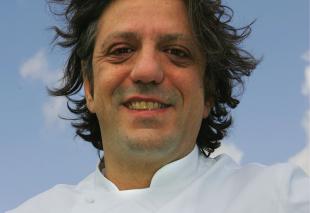

Celeb chef calls for character in restaurants

Michelin-starred celebrity chef Georgio Locatelli has denounced the service in many of Dubai’s hotel restaurants as “subservient” and “like slavery”.
“It’s all about subservience — service hasn’t got attitude here. It’s more like slavery; that’s what passes for good service,” he asserted.
“The problem is that the majority of restaurants [in Dubai] are part of a hotel. Often in a hotel, the property itself overshadows the restaurant and it gets swallowed up; staff aren’t allowed to rock the boat.
“The noticeable exceptions to that are the independently-run outlets in hotels,” Locatelli continued. “That’s what Dubai needs more of: real restaurants, where the guys who are in charge are really in charge.
“You have to allow your staff to be in charge and in control. The guests are not in charge just because they pay — the waiters should be in charge, not the customers.”
Locatelli said the problem in Dubai came down to staff not being sufficiently empowered.
“All too often, staff here will face a situation where some idiot is complaining about not being able to have something that’s not on the menu. So why does he not go to one of the other 250 restaurants nearby? Why does he choose this one? But as an employee following certain guidelines, they can’t tell him to go away,” he commented.
“In Europe, good service means real quality; the person who serves you is proud, knows exactly what he’s serving and you better be nice to him if you want him to be nice to you, because if you say something to him that he doesn’t like, or you’re rude to him, then he’s allowed to deal with that.
“In my restaurants, if a customer is impolite to my staff I would just go and clear their table and get them out. And I have had to do that many times,” Locatelli added.
“Outlets here need to empower their staff. And the problem is that the owners are not in these restaurants so they are not in a position to lead by example.
“But there are enough people to change the set-up here now,” he continued. “So I think restaurants with character, independent ones, could be the next big thing.
“If you go to Zuma, for example, which isn’t in a hotel, the service there is the closest to Europe that I’ve seen.
“If you put them in a hotel, they’d have millions of complaints. Guests would say ‘oh it says this on the menu, but can I change this,’ and they’d tell them ‘no — this is on the menu, this is what you have; this is how it’s supposed to be made’.
“And that’s good; you need restaurants like this, with character and personality.”
Elmar Pichorner, operations director for Zuma Dubai, confirmed that the outlet had benefited from its free-standing location.
“One of the main benefits for Zuma is being located in the heart of the financial district, which was very important to replicate the urban buzz that Zuma London has established over the years,” he noted.
“Another benefit of being a free-standing individual restaurant is that we don’t have to provide beneficial access to resort guests, which resort restaurants inherently have to do. It results in a more urban crowd.”
Pichorner added that one of the major differences was “the absence of corporate restrictions – be it purchasing, training, human resources and all aspects of daily operations, allowing us a greater degree of individuality in everything we do”.
Another restaurateur keen to emphasise the benefits of operating outside a hotel environment was Kho Khorsandian, owner and manager of Sushi Sushi and Sarband at Century Village, a restaurant complex in the grounds of Dubai’s Aviation Club.
“We’re all operated by different owners; it’s not like it’s all in one hotel and everyone’s in one uniform, greeting you in the same way and saying the same things,” he said.
“Here, one restaurant’s style is completely different to another, so you get that variation like you get in other countries, where you walk down the street and you actually have a choice of totally different places to eat.”
Country Hill International general manager Dariush Rakhshanim, owner of Century Village’s St Tropez restaurant, added that it was this diversity that kept people coming back.
“People know that here they can get a wide choice of dining options in a small, community-like area,” he explained. “They can go to the Lebanese restaurant Mazaj, smoke a shisha and have a truly authentic experience, or you can just as easily enjoy an al fresco dinner at our French restaurant St Tropez; and if a group wants to sit in one restaurant, but some of them want food from another outlet, then we can accommodate that as well.
“All the Century Village outlets are individual, independent places, but they’re gathered in the same place and all work together to provide the best possible experience, which is really ideal for the customer,” he continued.
“And because the owners are heavily involved in the running of the outlets, we are there to deal immediately with any issues or challenges that might arise."